Local
Generation Next
Emerging leaders generate inspiration
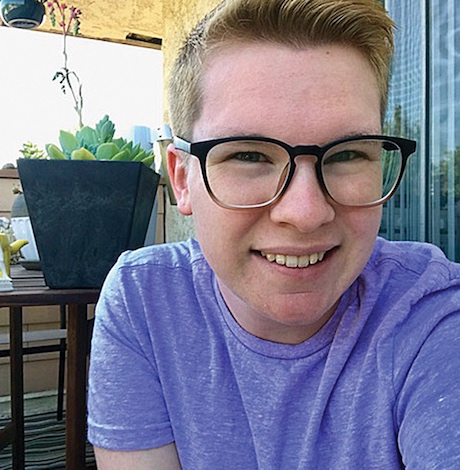
What is Pride? The most serviceable answer, of course, is that Pride is a commemorative event in which the LGBTQ community celebrates our triumph over adversity and the leaders who fought to make the world a more inclusive place. Historically, it was a political statement — a show of visibility and a forum for protest against homophobia.
And since the beginning of President Trump’s tenure, Pride feels political once more. This year’s celebration will pull from the civic engagement of the March for Our Lives and #Resist movements, spotlighting LGBTQ leaders while re-engaging in the community’s fight for social, legal, and political equality.
Much of that work did not begin, and it will likely not end, with the Trump administration. New research has found LGBTQ girls of color are disproportionately over-disciplined in schools, where they also face bullying and are ostracized. These challenges often push them out of the classroom and into the criminal justice system. And now that Betsy DeVos helms the U.S. Department of Education, prospects for many of our community’s most vulnerable youth are even grimmer.
At the same time, this year the country has witnessed the power of young people in bringing change. The young LGBT folks from the Los Angeles area profiled in these pages are speakers, students, advocates and artists. They have each made meaningful contributions in areas including climate change policy, battles against homophobia and transphobia, housing equality, and immigration.
As the LGBTQ community has witnessed and experienced a reversal in progress over the last two years, young leaders have offered hope for a better way forward. Another signal of the direction in which the arc of justice is headed: The decision by Boy Scouts of America to welcome girls into their ranks, and, effective next year, change the organization’s name to Scouts of BSA. Since the 1970s, women’s and LGBTQ advocates have lobbied the Scouts to adopt more inclusive policies. And in those battles, waged in and outside the courtroom, they have been ultimately victorious.
May these stories, challenges and history inspire you. Happy Pride.
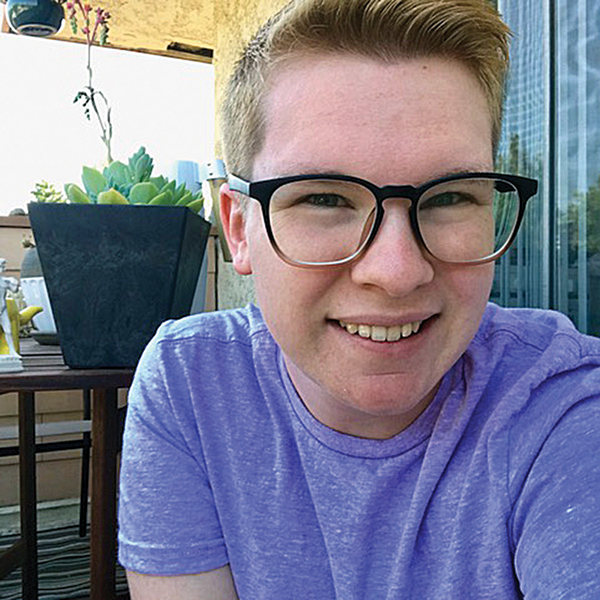
(Photo courtesy of Twitter)
Casey Hoke, 21, college student, LGBTQ advocate, artist
Casey Hoke is a fine artist, graphic designer, writer, activist, and advocate who was awarded a prestigious POINT Foundation scholarship to fund his education at California State Polytechnic Institute in Pomona, where he is now a junior pursuing a B.A. in Graphic/Communications Design with a minor in Art History. His past and present leadership appointments include a Student Media Ambassadorship for GLSEN, where he also holds membership with the National Executive Board.
Drawing from his experiences as a young trans man, Casey has spoken and written about subjects including education policies that concern transgender students, the representation of transgender people in the media, and the relationship between artistic self-expression and self-acceptance. His work has appeared in MTV News, Teenlife Media, and The Huffington Post, where he has blogged since 2014. Casey has delivered speeches at forums including a TEDx conference and Intel Labs’ LGBT Youth Leadership Forum.
Casey attended high school in Louisville, Kentucky. He came out as trans during his sophomore year. While fellow students, for the most part, were accepting of Casey, he explained the school’s Principal Gerald “Jerry” Mayes was a bully. In March, The Louisville Courier-Journal published a timeline of an ongoing investigation by Jefferson County Public Schools into Mayes’ conduct that was initiated in response to his treatment of trans youth, including Casey, as well as racially insensitive comments he made to two African-American students.
During his junior year, Casey was the subject of an article in the school’s newspaper that chronicled his journey and highlighted his advocacy work. In response, Casey explained, Mayes told members of the student newspaper staff that it was “wrong to profile a misfit going through a phase. He said it would be comparable to writing about someone who wanted to shoot up a school.” The following year, in 2015, as the state’s senate introduced a bill that would require transgender students to use restrooms that match the sex listed on their birth certificates, Casey said Mayes asked a security guard to monitor him in the men’s restroom. The principal then called Casey into his office and began asking invasive questions about his body and genitalia.
“It’s hard to talk about,” Casey said, “but I came out with my story because it needed to be heard, and because his treatment of LGBTQ students in my high school was, and still is, really bad.” Those experiences strengthened Casey’s resolve to advocate for the rights of trans students.
In college, Casey and his trans peers face a variety of administrative challenges. Changing one’s name on student ID cards is a difficult process. Freshmen, who are required to live on campus, must pay more for housing that offers single-stall restrooms (which are safest for transgender students)—a difference in cost that amounts to about $10,000. Administrators outed Casey to other staff and even students, despite his request that they keep information about his gender identity private. Casey has since led petitions that demand equal and affordable housing for trans students, as well as training programs on trans identity for university staff.
“My advocacy did not stop at high school, where I had this mean principal”, he said. “Even though I’ve seen trans folks accepted a bit more, publicly, there are still battles I have to face here in California.”
Casey’s interest in media representation of LGBTQ people and subjects overlaps with his interest in art. A project and educational resource that Casey created and curates, Queer Art History (housed online at queerarthistory.com) showcases a breadth of artwork, from a homoerotic 16th century Roman fresco to a poster produced by ACT UP Los Angeles in 1990. On the project’s website, Casey has written about the cultural and historical significance of each.
This project, he said, allows him to “talk about media representation while educating people of all ages on queer visual history, art, and culture.” Through another program, Art, Identity & YOU, which Casey created and administers in coordination with the Los Angeles LGBT Center, he provides a platform for youth education on identity, art, history, and self-expression.
Must modern queer art be political? Not necessarily, Casey said—it certainly can be, but queer art can also signify something as timeless as self-expression or look as visually diverse as abstract expressionism. Plus, the treatment of queer people as inherently political, Casey said, can be dehumanizing.
At a time in which major American cities have often become canvases for anti-Trump graffiti, contemporary queer art certainly feels political. And much of it borrows from the signage of protest art produced in the 1980s and 90s (A good example: Donald Moffett’s He Kills Me, a 1987 lithograph that features a grid of President Ronald Reagan’s grinning headshot with “THIS GUY KILLS ME.” in bright orange type across his chest.)
Through the POINT Foundation, Casey was connected with a mentor who works for the Walt Disney Company, where he aims to secure a design position post-college. He is optimistic about both his future and the direction in which society is headed, despite the anti-LGBTQ policies of the Trump Administration. “I asked Mara Keisling, executive director of the National Center for Transgender Equality, how things are looking for young trans and non-binary folks”, Casey said. Reflecting on the progress that’s been made so far, Keisling responded: “You know what? We’ve gotten here.”
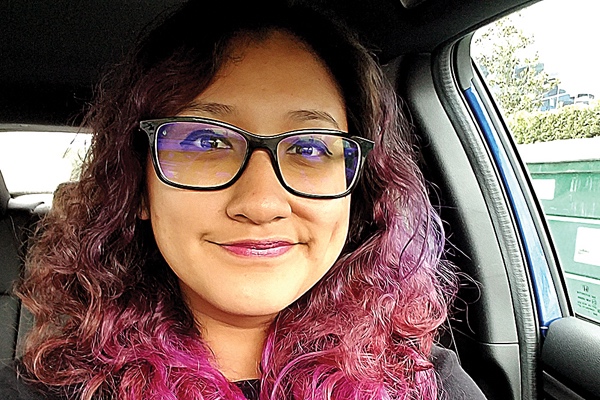
(Photo courtesy of Nunez)
Priscila ‘Pea’ Alegria Nunez, 23, documentarian and cinematographer
“The stories that I’m passionate about sharing and telling are about the Latinx community and LGBTQ community. It’s very important for me to highlight our voices, as immigrants who are fighting back.”
Pea is a documentary filmmaker, an artist whose work reflects their lived experiences as a pansexual non-binary immigrant who, at 15, left Peru with their mother for the professional and educational opportunities available in the United States.
A recent graduate of the acclaimed film program at the University of California, Los Angeles (UCLA), this year Pea was awarded a Rising Star Grant from GLAAD to fund their virtual reality (VR) project about the networks that immigrants have built to support and defend their communities. The film is led by a lesbian protagonist who left Honduras for the United States.
“Throughout the US, immigrant families they have this traumatizing event in which they are visited by [Immigrations and Customs Enforcement (ICE)]”, Pea explained. “Our protagonist is going to college, and she’s using her knowledge and her network to bring an emergency community back to her house. We will see how that event develops because of how many people will show up to help fight back.”
As an immigrant who belongs to the LGBTQ community, Pea is inspired most by the stories of people who occupy both of those identities. “I found that the projects that bring me the most fulfillment are those that find that intersection.”
Pea and their mother had green cards when they left Peru. They landed in Sacramento, where Pea says their high school was nationally recognized for the racial and ethnic diversity of its student body. “It was incredible to be surrounded by so many brown people—by so many inspiring, motivational people.”
At UCLA, Pea’s classes in gender studies opened their eyes to the identities that do not fall into the gender binary, which gave them the space to inhabit gender-neutrality, along with the freedom to dress and use pronouns in non-traditional ways. “It was another coming out for me. I’d already come out as bisexual, but then again as pansexual.” (The latter is defined by the absence of limits with regard to sexual choice in gender or activity.) Coming out to their mother—who understands Pea is attracted to both men and women—as non-binary, Pea said, is something of a work-in-progress, an ongoing journey.
Respective to both their personal life and professional work, Pea focused first on their immigrant identity and the stories of other immigrants more broadly before working to explore how sexual orientation and gender identity come into play.
Night of Cultura, a Latinx club of artists at UCLA, was a forum in which Pea found some of their closest friends and most valuable professional networks. The group creates plays, sketches, spoken word poetry, dances, and films—works that often include LGBTQ subject matter. “It was a space where I really felt like I blossomed.” After screening a 5-minute documentary at a Night of Cultura event, Pea met a UCLA alum in the audience who would later become the screenwriter for their VR project.
As a filmmaker, Pea is moved by the audience’s reaction to their work. “You can hear gasps; you can hear sniffles; you can hear laughter. I think that’s so beautiful because you wonder what’s going on in their hearts. There is a chance of really reaching people. There is hope that your project, that your work, will touch people.”
On the challenges brought forth by attacks on LGBTQ and immigrant communities from the Trump administration, Pea is optimistic about the role of the artist. “It’s important that we creators continue making work, regardless of the political climate. It’s important to keep creating, because who is going to do it, if not us?” Immigrants and LGBTQ folks should tell their own stories, Pea said, because that way the diversity within those communities will be reflected in the broader cultural narrative.
In hindsight, Pea feels they should have explored and expressed their sexual orientation and gender identity earlier in life. “I felt like I needed to be compliant to what my mom wanted—to her expectations. I could have been so much happier, if I had not waited and instead just been myself.” Pea’s message to LGBTQ teenagers: “Come out to your friends first, because there is something to be said for finding your family outside the family you grew up with. Find yourself a queer family. When you do, you’ll be amazed how powerful you’ll be.”
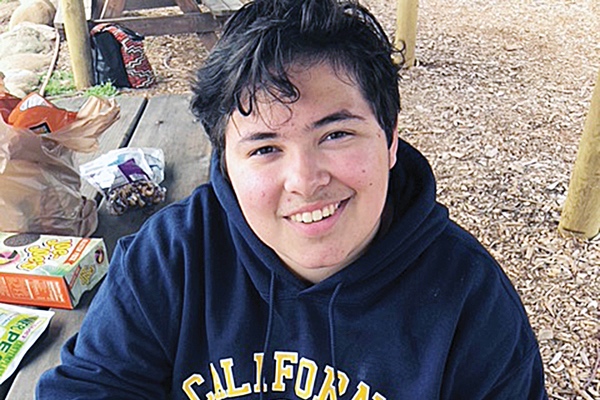
(Photo courtesy of Reyes)
Aris Reyes, 16, high school student, LGBTQ advocate
Aris is a 16-year-old high school student who aspires to a career in politics, business, law, or, perhaps all three.
Though only a junior, Aris has emerged as a leader at USC East College Prep, a new high school of which his will be the first graduating class. He founded both the student government and the GSA club, where he now serves as president.
As a young trans Latino man and LGBTQ advocate, Aris has built bridges between his school’s students and staff, as well as between his peers and organizations dedicated to LGBTQ youth education and empowerment.
He helped to spearhead the LGBTQ School Climate Resolution, a comprehensive survey that collects information about a school’s educational atmosphere respective to LGBTQ issues. Aris was not entirely surprised to learn 80 percent of his classmates had either often or occasionally heard homophobic remarks from other students. On the other hand, only 10 percent of student respondents heard their teachers say something objectionable about LGBTQ people, which is consistent with Aris’s perception that educators at his school are more liberal and tolerant.
With data from the survey, Aris approached his teachers about ways they could help improve the school’s record on LGBTQ issues. He cited California’s FAIR Education Act, which, among other requirements, obligates teachers to include LGBTQ historical figures in their lesson plans. The law applies only to the state’s public schools, so teachers who work at Aris’s charter school are free to create their own lesson plans—and there, he said, there is room for substantial improvement.
Aris worked with the Latino Equality Alliance’s (LEA) youth council to coordinate a speaking engagement at his school that featured a representative from the ONE Archives of the University of Southern California (USC). “They talked about LGBT leaders and advocates”, he said, “including some people I’ve never heard of in my life.”
The organization administered 10 workshops throughout the year, including the Unconditional Love Rally, where Aris spoke about transphobia and his personal journey toward self-acceptance. The program required registrants to get prior approval from their parents, but Aris worked with school administrators who agreed to count the rally toward community service hours—which helped to bolster attendance.
Aris opened up to his mother about his gender identity in eighth grade and the following year came out to friends, teachers, and classmates. Like many transgender youth, Aris struggled with body image issues and depression. Not yet out to his father and living in a body that did not reflect his gender identity, while a freshman Aris was placed in a three-day psychiatric hold. There, he was isolated away from other patients—and told by nurses he could not be placed in units segregated by gender because he is neither male nor female. This, in spite of the fact that Aris explained he is a transgender man.
Back at school, Aris is sometimes asked probing questions by other students concerning his anatomy. “My school is in Lincoln Heights in Los Angeles”, he explained, “and Hispanic culture is not always that accepting of LGBTQ people.” Teachers, by contrast, have been more welcoming—he only needs to remind them, occasionally, to not mis-gender him.
Administratively, Aris has met challenges such as the attendance roster and the separation of girls and boys in advisory periods. “It can be isolating”, he said.
Involvement in advocacy programs and social clubs has allowed Aris to build a sense of community and work on behalf of issues that are important to him. “Even within the LGBT community”, he said, “I feel like trans people are left out a lot.” The separation of gender and sexuality in the discussion of LGBTQ issues, as well as the ways in which we introduce these topics to young people, is important to Aris. The conflation of sexual orientation and gender identity, he said, can cause misunderstanding.
Aris also hopes the Hispanic/Latino communities will begin to adopt more progressive attitudes toward LGBTQ people. He feels less tolerant attitudes exist primarily among older generations. “Friends have told me”, he explained “‘My mom doesn’t like you because you’re trans.’ It’s just sad—just because of that, like, [they don’t care] about everything else I do, what a good kid I am, my grades or my education.”
Homophobia and transphobia will always exist, Aris said, and “people are scared of things they don’t now”. Looking to the future, he is more interested in effecting change through policy. “For me, really what matters is the legislation—that’s what changes everything. If you’re a lawyer or a president or lobbyist, you’re in a position to change things.”
Aris expects to continue working on behalf of LGBTQ causes. “After I graduate”, he said, “I hope to go to college. I want to get really involved in my college.”
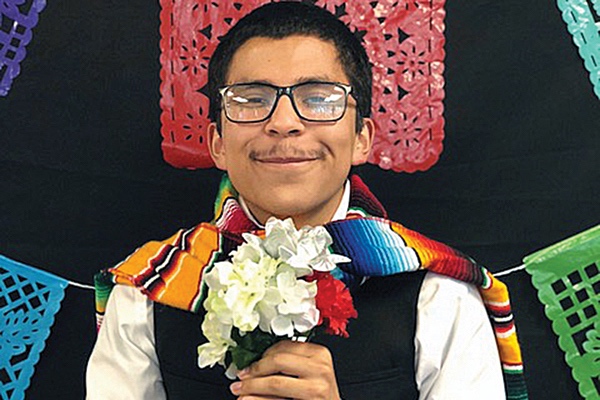
(Photo courtesy of Medina)
Alex Medina, 18, student journalist, LGBTQ advocate
Alex Medina is a student journalist who has authored more than 20 articles for his local newspaper, the Boyle Heights Beat, which covers news and feature stories in and around the downtown Los Angeles neighborhood.
He will soon graduate from high school and is eager to begin his freshman year at Hamilton College, a selective liberal arts university in update Clinton, New York. Then, Alex hopes to work toward a career in journalism. And he also has designs to start an organization dedicated to youth and the media.
Much of Alex’s work for Boyle Heights Beat is focused on LGBTQ issues, which he considers especially important because, particularly in decades past, LGBTQ people are often portrayed negatively. He said that spotlighting the work of advocates and activists helps to usher in progressive change while also offering role models for young people. Additionally, Alex has written about subjects important to immigrant communities—such as the census and the Free Application for Federal Student Aid (FAFSA)—as well as local politics and business.
For two years, Alex has served as president of his school’s GSA club, where he led efforts to curb the use of derogatory language and anti-LGBTQ slurs. In conversations with the student body, Alex and members of the club worked to encourage their peers to be more conscious of the language they use. “I used to get bullied when I was younger. So, it’s important to me that we have these conversations”, he explained, especially for the benefit of young LGBTQ folks.
Beyond the GSA, Alex works on behalf of a variety of causes that reflect the diversity of the subjects he has written about. Through his involvement with the Latino Equality Alliance (LEA), for example, Alex has advocated for policies that would help to curb the school-to-prison pipeline.
Alex credits many of his accomplishments to the unwavering support he’s received at home. His parents, who immigrated to Los Angeles from Mexico, have been involved with organizations like PFLAG—where they engage with other parents, many of them Latino, to facilitate conversations about accepting their children’s sexual orientation and gender identity.
It can be challenging work, he said. LGBTQ identities are often not discussed within Latino communities. “Youth often don’t come out to their parents because they’re afraid how their parents will react,” he explained. “When Latino people [immigrate to the US], there are prejudices—often formed by the things they heard when they were growing up—and they often bring that with them. It’s also generational.”
While young people have overwhelmingly adopted more positive positions on LGBTQ issues, change can also be witnessed in traditionally-conservative milieu, such as the Catholic Church. Just a few weeks ago, Pope Francis told a gay man, “God made you like that.” Alex agreed about the direction in which organized religion seems to be heading, at least concerning Catholicism. “With the Pope being more accepting,” he said, “it’s getting better. At my own church and at the other church I’m involved with, they’re accepting of me and the pastors communicate very positively about it.”
The role played by organizations, like PFLAG, that offer programs and resources for LGBTQ youth and allies is really important, Alex said. “In schools there often isn’t much awareness, even if there is acceptance, so these organizations help to fill in and offer resources—including condoms, and healthcare referrals—that are not available in school. There are a lot of events and opportunities available through those organizations that students wouldn’t otherwise know about. It’s important for parental acceptance as well.”
Alex feels the tremendous progress the LGBTQ community has witnessed over the years would not be possible if advocates and activists were not optimistic about their odds. “We wouldn’t have the movement we have today without people who brought awareness about things like AIDS, DOMA, and [same-sex] marriage”, he said. Beyond the fight for political equality, Alex feels adopting a positive attitude is important for building friendship and community.
Another corollary goal of Alex’s: Increasing the visibility of young people who are working to effect change. “A lot of times”, he said, “youth don’t see themselves represented. It’s important to bring attention to the work young people are doing to build a better future for themselves and for future generations of youth”.
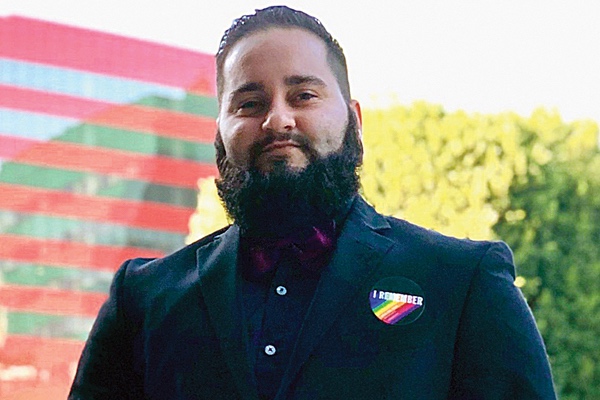
(Photo courtesy of Akbarian)
Rudy Akbarian, 28, trans-Armenian veteran, aspiring barber
Rudy Akbarian is a transgender man, the son of Armenian immigrants, and a veteran who served in the U.S. Army from 2011 to 2016. He has also worked on behalf of LGBTQ youth, specifically homeless youth, and next month will begin studying to become a barber.
Before today, Rudy has spoken out twice about policies concerning the inclusion of openly-trans men and women in the military. In 2016, he praised the historic decision by former Defense Secretary Ashton Carter to welcome transgender people into the armed forces. Then, last year, he denounced President Trump’s reversal of that policy but pledged to keep up the fight: “I’ve had too many people supporting me to just give up,” he said. “So, I don’t plan on doing that.”
Today, Rudy responded to reports from Tuesday that 100 members of Congress have submitted a letter to Defense Secretary James Mattis, urging him to reconsider the Administration’s decision to bar openly trans men and women from military service.
“That’s awesome,” he said. “But I don’t know what [Trump’s] reasoning was for not allowing trans people to serve in the military, other than ‘It would cost a lot of money.’” And this, Rudy pointed out, despite the President’s request for a military parade that The New York Times reported could total $30 million (at a time in which those funds could be better allocated to address homelessness among America’s veterans).
Importantly, Rudy added, the projected medical costs associated with treating the estimated 15,000 trans men and women in the armed services—which, according to a RAND study, would add up to $8 million—are likely even less. “Not every trans person wants to surgically or medically transition,” he explained. “That’s a stereotype we need to break.”
Rudy’s position on the capabilities of trans soldiers?
“After I conquered that battle to become my authentic self—and I did it alone—now, God only knows how many other battles and wars I can win with a team. Trans people are some of the strongest people and some of the most mentally capable people to protect and serve this country.”
Rudy said most of the transphobia he has encountered so far has been in civilian life. The men and women who served alongside him were focused on the demands of the mission before them, and close bonds were born from shared experiences and the close quarters in which they worked and lived.
Restroom and shower accommodations, particularly while Rudy was in the process of transitioning, proved challenging. Without an official gender marker that matched his gender identity he was not allowed to access the men’s facilities. Once, during a five-day range training excursion in the desert, Rudy had to use the women’s showers. And by this time, he had grown a full beard. “It was a super traumatizing experience for me, as well as for them. Because, they’re like, ‘Why is there a guy in the shower?’”
However difficult it was, as a trans man, to navigate the administrative hurdles of military life, Rudy had already weathered a lot of heartache. He came out first as a lesbian and was consequently kicked out of his home. “It was a really hard time in my life,” Rudy said. Like many young people in his position, he abused drugs and alcohol to cope. For more than six years now, Rudy has been sober—and his family eventually reconciled with him.
At first, he explained, the subject of his sexual orientation was off the table, but then Rudy journeyed closer to accepting his gender identity. “It was undeniable when the hormones kicked in,” he explained. “Then, I gave my family the choice to be there for my top surgery, and they showed up.” Rudy said they are now 120 percent supportive.
“One time, I discovered that my mom, who has this heavy Armenian accent and types the way she talks, was responding to these negative comments about me on social media. [Imitating her accent] ‘That’s my son and I love him and he’s very handsome!’ She was totally there in support, doing all of this emotional labor. It was so incredible to see that.”
These days, Rudy is incredulous about the policies introduced and supported by the President, especially those concerning transgender men and women in the armed forces. At the same time, he has witnessed tremendous progress in both his family and community—especially among young people—which, he said, signals movement in the direction of justice and equality.
Through social media, Rudy has comforted other LGBTQ folks, including Armenians who are struggling with coming out to their families. It’s just another form of advocacy, he said—a way to build and strengthen community.
Recently, Rudy was invited, by his former art teacher, to speak before a high school group called Students Advocating Gender Equality (SAGE). “When I was [a student] there,” he said, “there were three students in GSA, and I was one of them. At this event, I was talking to, like, 50 kids. They were all embracing and accepting each other—and it’s students in high school who are creating these clubs and programs.”
West Hollywood
West Hollywood officially welcomes a new transitional housing program
The Holloway Interim Housing Program provides 20 rooms for chronically unhoused individuals
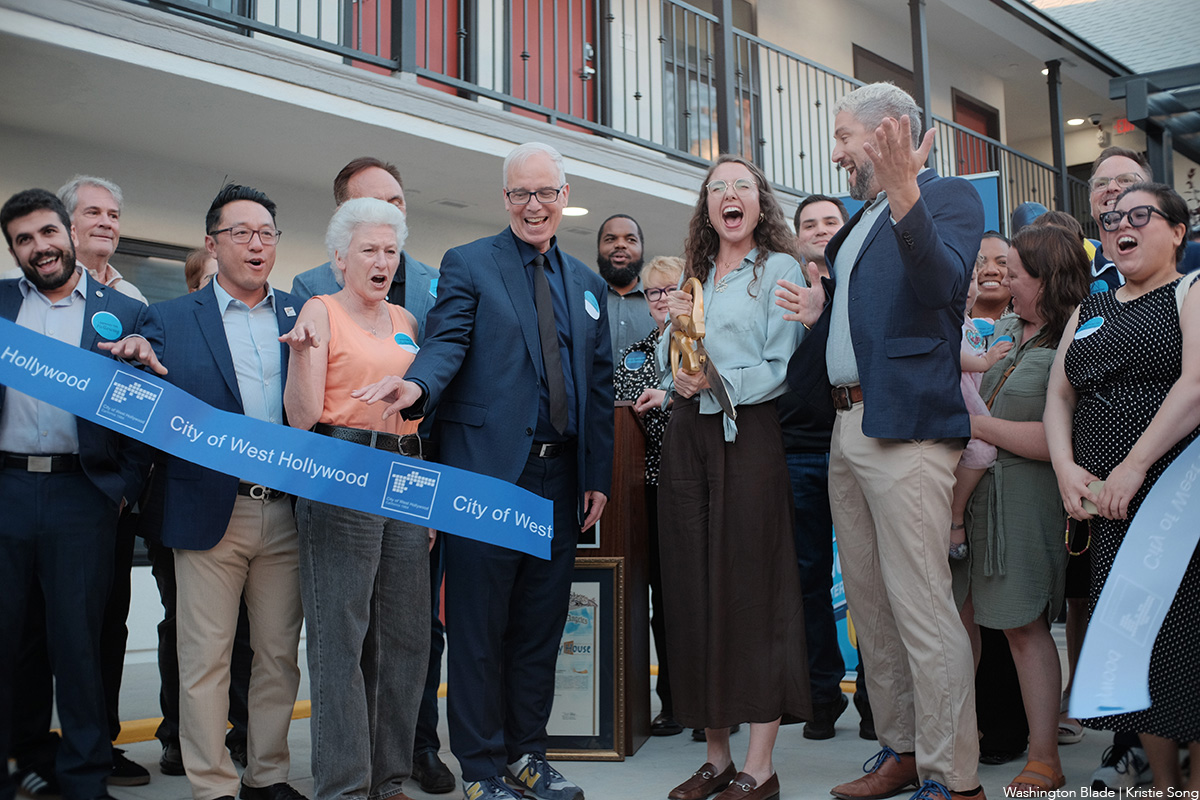
On Tuesday evening, hearty crowds mingled in the courtyard of the old Holloway Motel, buzzing with excitement as West Hollywood mayor Chelsea Byers took the podium. All gathered for the ribbon-cutting ceremony and an open house preview of the Holloway Interim Housing Program, the city of West Hollywood’s latest step in its five-year plan to address chronic homelessness.
In 2022, West Hollywood received a Homekey grant of $6 million from the California Department of Housing and Community Development and purchased the property at Holloway Drive the following year, with plans to revitalize the space into a supportive facility for unhoused community members. After years of development, the Holloway Interim Housing Program is ready to open. The city is partnering with Ascencia, a nonprofit that provides services to unhoused individuals and families, which will manage daily operations at the facility and provide direct support to residents.
“This program is not just short-term housing. It’s a stepping stone towards housing, health, and stability for the long haul,” said Byers, addressing attendees. “This project is what happens when a city puts its values into action. The Holloway is a safe haven and a second chance. It’s a promise kept.” Wielding large golden scissors, Byers cut the ribbon to signal the start of the program, smiling elatedly while surrounded by fellow councilmembers and staff.
The Holloway Interim Housing Program holds 20 private rooms, and residents will be allowed to stay for up to 90 days. As of now, program participants have to be referred by local homelessness service providers and outreach teams to be able to stay at the premises. During this time, they are connected with case managers and will receive counseling and support on healthcare, employment readiness, and pathways into securing permanent housing. Meals will be provided, and community spaces will also be available for residents to engage in workshops, recovery groups, and other communal programming together.
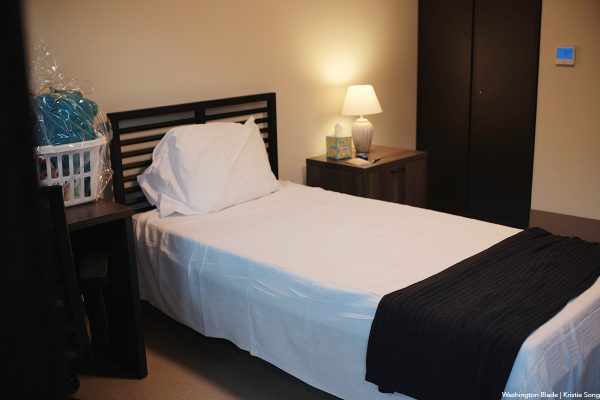
“We have communities that basically respond to the homeless crisis by moving the problem to someplace else,” said California Assemblymember Rick Chavez Zbur, who was also present at the ceremony and open house. “Really, without transitional supportive housing, we don’t provide opportunities for people to move into long-term housing, and that is a key part of the building block that is underfunded and under-invested in.”
When will the program officially welcome its first group of residents? This upcoming Monday, on Oct. 6th, Ascencia Director of Programs Marcell Mitchell told the Blade. Mitchell also explained that Ascencia hopes to keep the program at full capacity. When residents are leaving, someone else from their waiting list will be contacted to fill the space. “We’re ready to get going. We’re ready to start helping people,” Mitchell continued. “It’s definitely a good first step forward. We’ll be able to help people in the community where they’re at, get them going, and get them back to their normal lives.”
California
Congress members, public health organizations urge Governor Newsom to sign bill amidst threats to PrEP access
Two letters have been sent to the governor, calling on him to sign AB 554 into law by October 12th
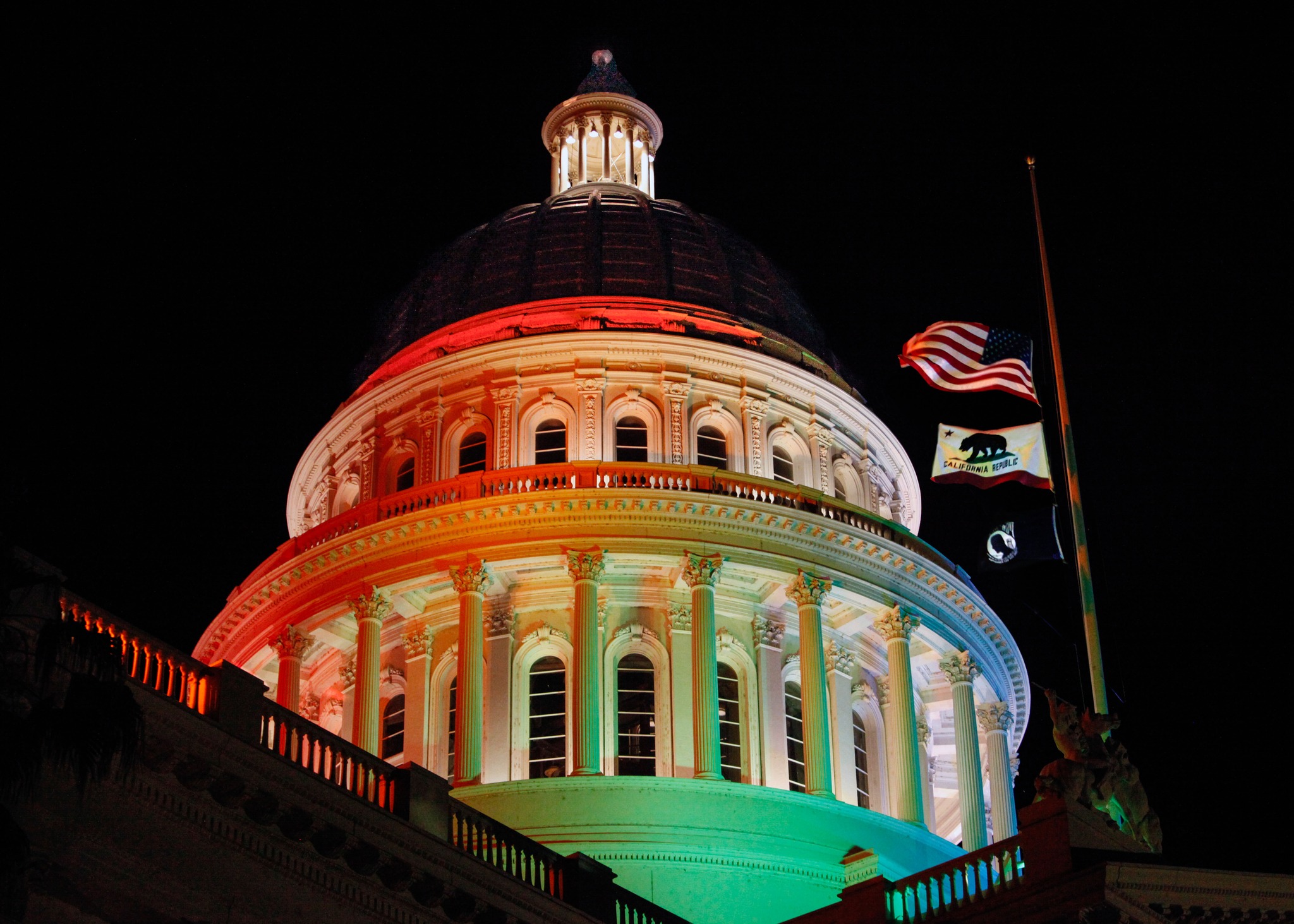
On September 24th, 13 Congress members penned a letter to the governor, asking him to sign AB 554 — or the PrEPARE Act of 2025 — into law. If passed, the bill would strengthen existing state laws around health insurance coverage and access to preventative medication for individuals affected by HIV/AIDS.
AB 554 would require health plans and insurers to cover all FDA-approved PrEP medications, including injectable forms, without prior authorization or step therapy. The bill’s co-authors and supporters emphasize the need to bolster support for impacted individuals and communities, ensuring that they can access effective treatment plans with as few systemic barriers as possible. The bill also includes protections for community clinics, so that they are reimbursed promptly and able to provide medication for impacted people.
In this letter, co-signed by local elected officials including District 42 Representative Robert Garcia, District 43 Representative Maxine Waters, and District 34 Representative Jimmy Gomez, the coalition of Congress members cites a number of reasons for this call to action.
Namely, they state that the Department of Health and Human Services Secretary Robert F. Kennedy, Jr.’s reported desire to oust all members of the U.S. Preventive Services Task Force — an independent panel of disease prevention experts that provides recommendations to insurance companies, doctors, and other health professionals — is a move that “risks reversing decades of progress in the fight against HIV, one of the most devastating epidemics in history.”
They also write in the letter that insurance cost-sharing restrictions are especially harmful towards Black and Latine communities, who “accounted for over 70% of new HIV diagnoses [in the state] yet remain significantly underrepresented among PrEP users compared to their White counterparts.”
In a separate letter addressed on September 25th, over 90 advocacy groups and public health organizations similarly stressed the importance of AB 554 to the governor. Here, they discussed CVS Health’s decision to not approve coverage for Yeztugo, the first twice-yearly injectable PrEP medication, even though it was approved by the FDA in June.
The organizations that have signed on include LGBTQ+ civil rights organization Equality California, as well as resource outreach groups such as the AIDS Healthcare Foundation and the California LGBTQ Health & Human Services Network. They write that CVS’s “dangerous decision underscores the urgent need for additional clarity in state law to ensure that all FDA-approved PrEP medications are covered without cost-sharing, guaranteeing that lifesaving innovations are available to Californians without delay.”
The letters highlight a need to address equity and accessibility for those impacted by HIV/AIDS, specifically those who belong to marginalized communities. AB 554 received a majority vote of support by both the California State Assembly and Senate on September 10th, and now waits in limbo for Governor Newsom’s signature. He has until October 12th to sign or veto the bill.
In the meantime, Equality California encourages community members to visit their website to learn more about the bill, other pending LGBTQ+ state legislation, and how they can support these movements.
Los Angeles County
New direct cash program aims to prevent youth homelessness in Los Angeles County
CASH LA launches as the first youth-focused direct cash assistance program in Los Angeles to prevent homelessness among LGBTQ+ young people and youth of color.
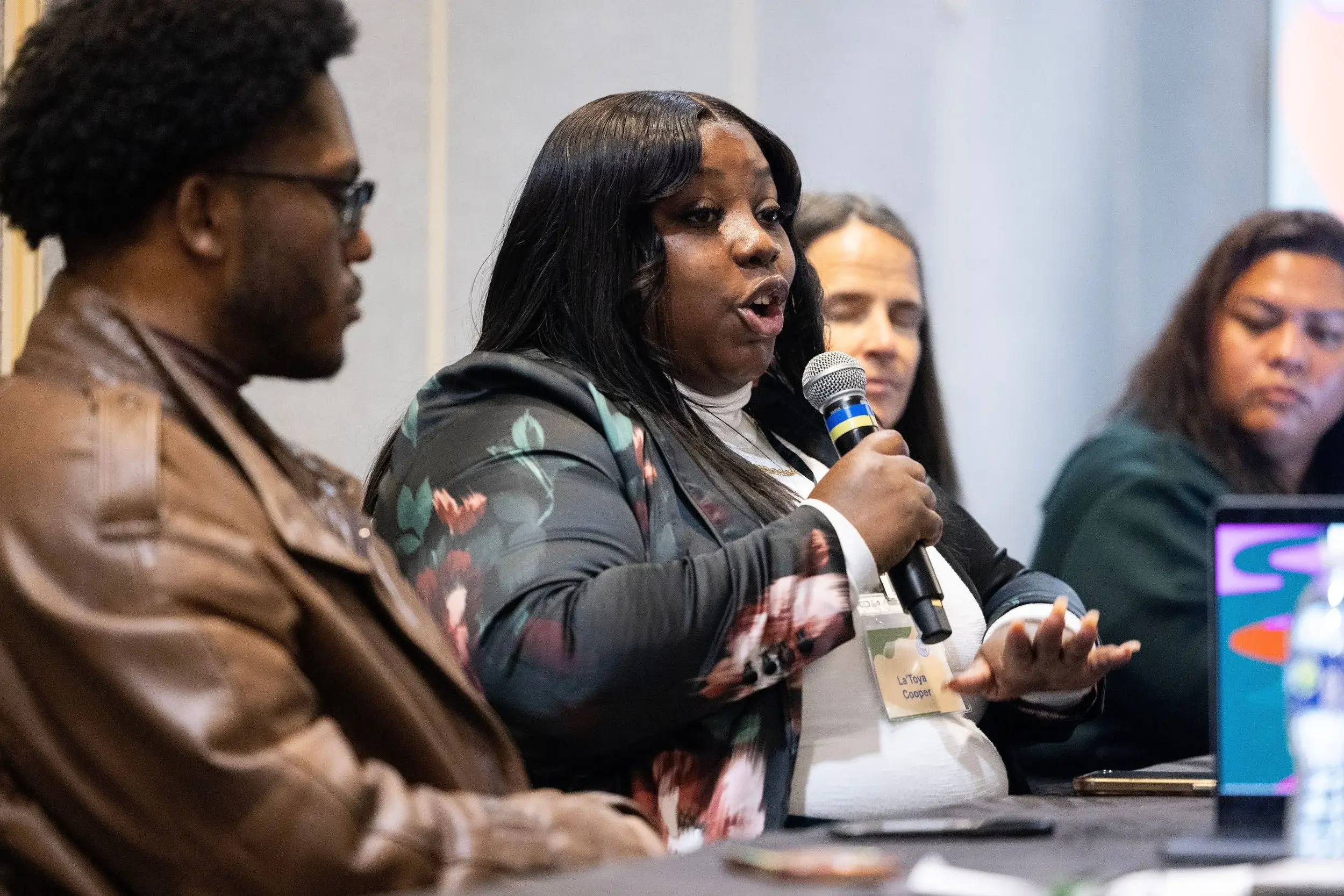
A new pilot program called CASH LA has launched in Los Angeles County, offering direct financial assistance to young people at imminent risk of homelessness. The initiative is a partnership between Point Source Youth, LA Emissary, and AMAAD Institute, with support from Cedars-Sinai and the Conrad N. Hilton Foundation.
Unlike traditional homelessness prevention programs that often focus on eviction cases or families, CASH LA takes a youth-centered approach designed specifically for people ages 18 to 30 who are on the verge of losing housing but are not yet unhoused. Participants create a personalized housing action plan with a trained provider and receive direct cash assistance to carry it out.
In a joint Q&A with the Los Angeles Blade, representatives from Point Source Youth, LA Emissary, and LA Emissary’s Young Adult Pooled Fund, including Larry Cohen, Leanndra Martinez, and Abby Gibson, shared their perspectives on the program. Organizers said CASH LA is the first program in Los Angeles to provide direct cash assistance to young people at imminent risk of homelessness while funding a personalized housing action plan. “Other programs have many requirements, are slow to implement, and youth, and especially LGBTQ identifying youth, do not access them,” they added.
For LGBTQ+ youth and youth of color, who experience homelessness at disproportionately high rates, CASH LA is designed to provide flexible support that meets their urgent needs. Organizers explained that the program “uniquely centers, responds, and funds what LGBTQ youth, youth of color, and LGBTQ youth of color need directly” while also addressing systemic barriers such as homophobia, transphobia, and the lack of affordable housing. “CASH LA gives young people the funds to be able to stay in their housing and allows them to utilize the funds for their identified needs,” they added.
Youth leadership is also embedded throughout the program. Members of the LA Emissary’s Young Adult Pooled Fund helped design and fund the initiative, from drafting proposals to selecting partners. “From start to finish, young adults are involved in every step,” organizers explained. “They decided to invest in direct cash transfers and collaborated with Point Source Youth to develop the RFP, review the proposals, and make decisions about which organization to fund.”
Direct cash transfers are at the heart of the model. Organizers said the approach works because it removes barriers and provides immediate resources for urgent housing crises. “If a young person is in a crisis that is going to lead to them experiencing homelessness, resourcing them to get out of that crisis with cash and support is what works,” they said. “Young people use the cash for housing, back rent, food, transportation, and the things they need to not enter the homeless system in the first place.”
The program’s impact will be tracked through surveys and data collection in partnership with Johns Hopkins University, measuring housing stability, financial well-being, and overall health. Early results from similar efforts in other states suggest high success rates. “Studies indicate that, with an average of 90 percent of respondents reporting they have achieved stable housing in the first 30 days, and looking at the Central Diversion Fund, that rate was over 90 percent in 12 months,” organizers said.
Critics of direct cash programs sometimes question whether youth will spend the money responsibly. Organizers rejected that notion, pointing to consistent research and outcomes. “When we trust young people to know what they need and then meet them where they are with the right support, we can prevent homelessness before it starts,” they said. “Young people use the resources responsibly, as part of their housing action plan, they work with a prevention specialist, and then, 90 percent of them do not enter the homelessness system. And it is cost-effective. What other programs can say that?”
As the pilot rolls out in Los Angeles, Point Source Youth is also working with funders to expand direct cash programs in ten communities nationwide. Locally, CASH LA is continuing to enroll participants until funds are fully distributed, with hopes that evidence from this pilot will pave the way for long-term investment.
“The most powerful lesson we have learned from youth is that we need more dedicated and flexible resources for young people,” organizers said. “We need to make sure all LGBTQ youth at risk of homelessness in LA have access to a program to effectively prevent them from experiencing homelessness in the first place.”
West Hollywood
West Hollywood’s Red Dress Day: a cocktail of queer euphoria, dance, and discontent
An organizer said it was “like pulling teeth” trying to raise funds
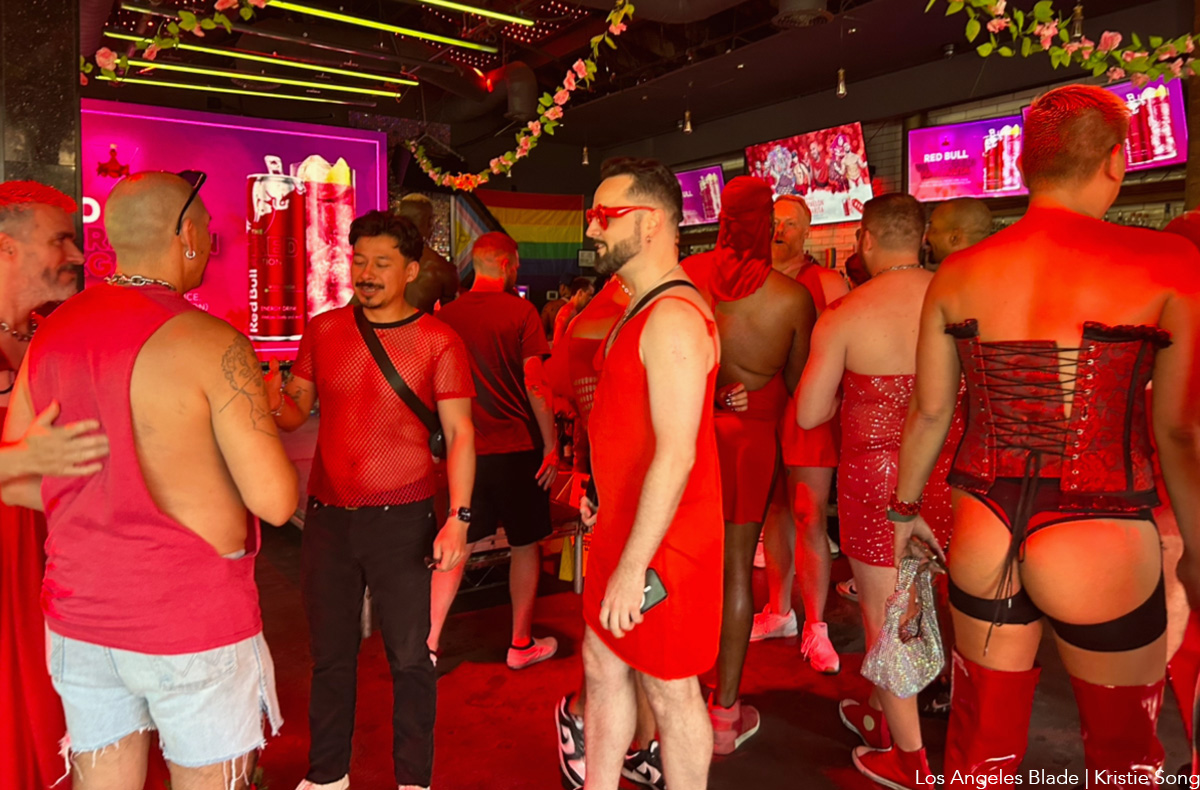
Red lights flooded the intimate space at Rocco’s WeHo Sunday night, as Anita Ward’s sultry 1979 disco hit “Ring My Bell” bewitched the dance floor. People clad in all-red leather outfits, dresses, mesh shirts, elegant gowns, and ruffled sleeves mingled and swayed their hips to the loud, thumping beat of funk-infused club classics. They were gathered together for West Hollywood’s annual Red Dress Day, a community fundraising event centering HIV/AIDS awareness.
Red Dress Day, also known as the Red Dress Party, is celebrated in cities across North America, and offers a space for new and longtime friends to commemorate the resilience of their communities, embrace queer joy, and raise funds for local organizations providing resources and services to individuals affected by HIV/AIDS.
At this year’s West Hollywood iteration, organizer and host Billy Francesca strutted in and out of the nightclub in tall black pumps, holding the end of a long red sequined dress in one hand and a microphone in the other. Throughout the evening, Francesca greeted attendees and urged them to purchase a red wristband, which would allow them access to community drink specials at Rocco’s and other nearby bars participating in the day’s festivities. The funds from these donations were to be donated to The Wall Las Memorias (TWLM), an organization dedicated to providing inclusive and culturally-competent HIV/AIDS care to underserved Latine communities.
TWLM offers HIV testing and counseling, peer-led support groups, consultations around health services and insurance coverage, as well as community programs and workshops around advocacy, health prevention and mental health destigmatization.
While excitement and dance was ripe in the air, there was also discontent behind-the-scenes.
As more and more people began to trickle into Rocco’s, only a few had purchased a red wristband. “Years ago, it was like: ‘Who needs what? How can we help? What can I do?’ Now it’s like pulling teeth,” Francesca told the Blade, frustrated at the lack of concrete donation support from attendees. “It’s disheartening, because the gay community wasn’t like this when I was coming up and out. People were just more there for each other.”
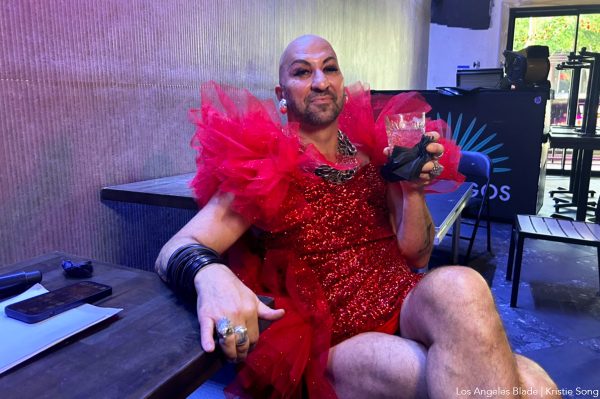
Francesca first began organizing for Red Dress Day in 2023, after the event had entered a hiatus through the pandemic. Moving forward, Francesca hopes to take a more background role in planning, stating that it’s become too much work for him. From rallying bars together and making sure drink specials were being properly distributed, to greeting attendees and making sure everything was running smoothly and on time, Francesca’s capacity has grown thin. “It just needs to be tightened up,” Francesa said, who is passing the gauntlet to Matthew Zaslow.
Zaslow, a Red Dress Day producer and founder of event planning agency Eventure Productions, is set to take on larger responsibilities for future Red Dress celebrations in West Hollywood. “I’m trying to make it a lot bigger,” Zaslow tells the Blade. “The big ones are San Diego and Palm Springs. So that’s my goal — in two or three years, to make it as big as that.”
As the event evolves, longtime attendees like Charlie McCrory are eager to continue to show up. It is an opportunity to band together in unabashed and free queer expression: to resist, to remember, and to hope. “We had to go through a lot to be here today,” McCrory told the Blade. “As a community, we’ve gone through a lot. And we need to remember that. We can’t forget it. And we need to relish, to celebrate.”
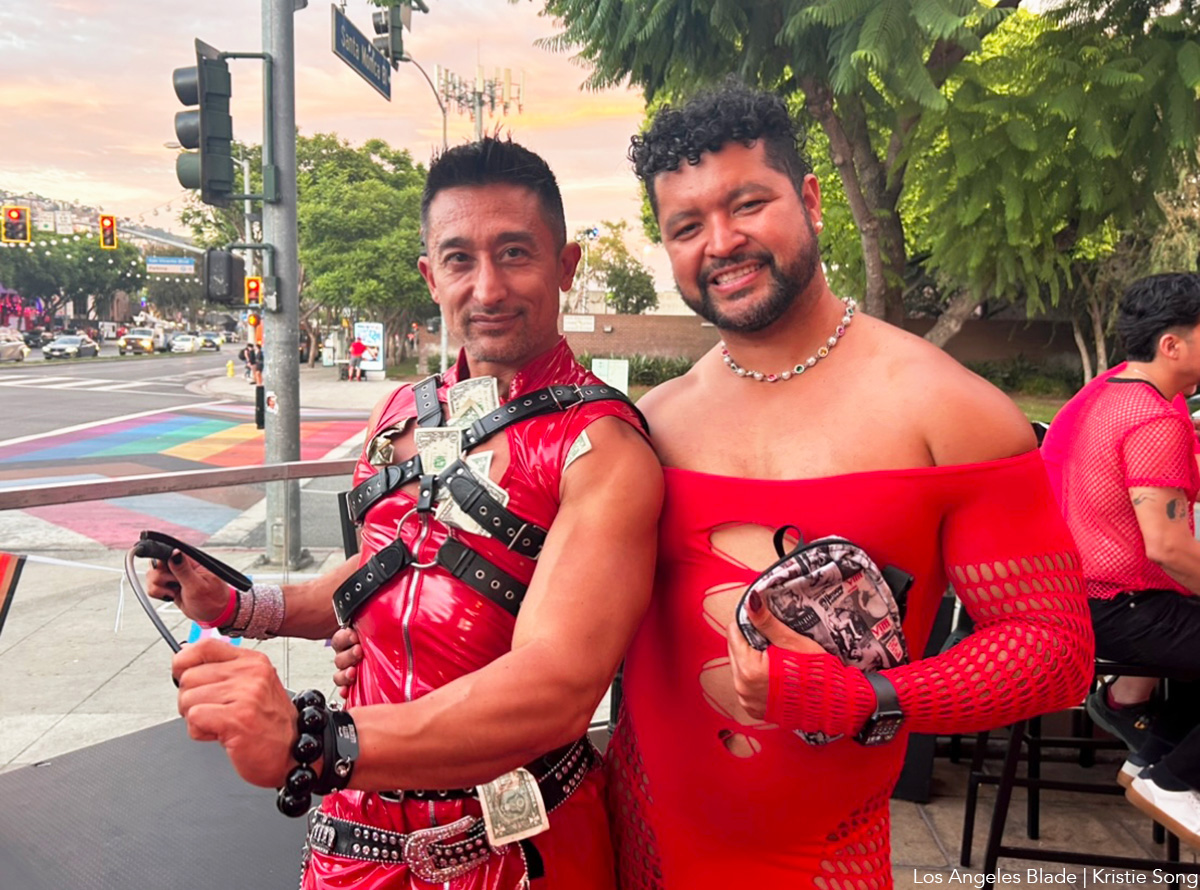
Los Angeles
The TransLatin@ Coalition campaigns for $20 million to support new housing initiative
If approved, the funds will go towards homelessness prevention
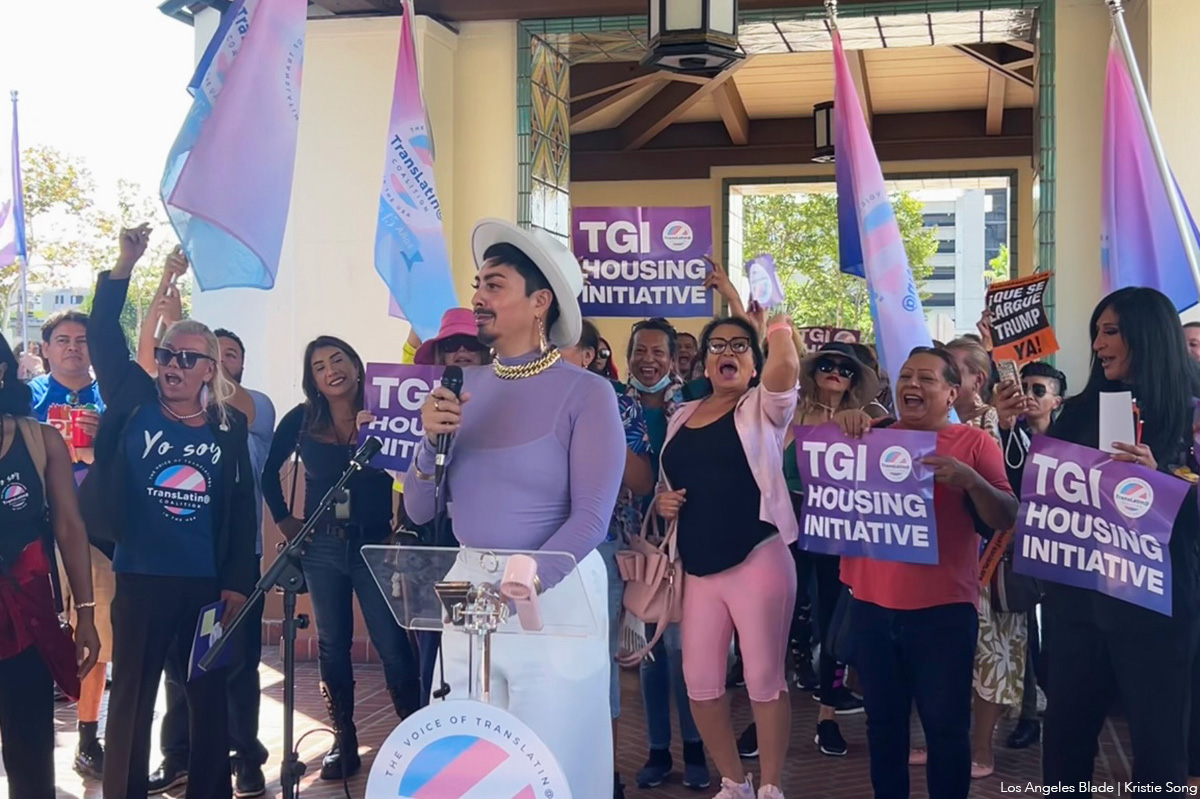
On Wednesday afternoon, over 50 people gathered in the heat outside the Metropolitan Water District. They waved large transgender pride flags and chanted at the top of their lungs: “Aquí está la resistencia trans!” Here is the trans resistance.
Leaders of the TransLatin@ Coalition (TLC), an organization formed by transgender, gender-expansive and intersex (TGI) Latine immigrants to support their fellow community members, led these jubilant calls for action at their press conference yesterday.
TLC organized this event to announce the launch of their new campaign, the TGI: Housing initiative. The group hopes to partner with the Los Angeles County Affordable Housing Solutions Agency (LACAHSA), an organization that was established in 2023 after the passing of SB 679: a bill aimed to increase affordable housing in the region.
What is TLC asking for? $20 million to invest into their communities. If approved, the funds would be allocated towards homelessness prevention resources like housing rental assistance and legal support clinics, specifically for TGI system-impacted individuals, seniors, transitional age youth, disabled community members and immigrants. “We are investing in people, not just programs,” said Queen Victoria Ortega at the press conference. Ortega is a chief visionary officer for the Connie Norman Transgender Empowerment Center.
“Housing is the foundation for opportunity,” Ortega continued. “When you are able to be in a safe, warm home, you’re able to take your medications. You’re able to take a respite. You’re able to think about the next step that you’re going to take. And really, why wouldn’t you want that for your neighbor? I end with saying: invest in trans lives.”
Authors of a June 2024 report published by the Williams Institute, a research center that informs public policy for LGBTQ+ communities, found that 47% of trans and nonbinary adults in the county live below 200% of the federal poverty level and face significant food insecurity and housing instability.
TLC is calling upon LACAHSA to utilize money from Measure A, a countywide half-cent sales tax that went into effect this April. The measure, meant to address the county’s homelessness crisis, generates over $1 billion annually and 33.75% of these funds are provided to LACAHSA. This amounts to over $380 million for the organization.
“Right now is the time for us to be invested in. We have a federal government who is trying to erase our existence,” said Bamby Salcedo, president and CEO of TLC, to the crowd. “That is why we’re calling on the LACAHSA board to commit to community engagement and partnership to ensure that this funding is community-led and that it is invested in all of us.”
Then, Salcedo led another chant. “Can we do it? When I say ‘People,’ you say ‘Power!’ People!” “Power!” Their voices carried like bells across the courtyard: a loud, clear and unbroken chorus.
As the press conference came to an end, TLC leaders encouraged community members to attend the LACAHSA board meeting happening right after, at 1 p.m. ChiChi Navarro, an active local advocate and a policy intern at TLC, explained how to make the most of their allotted minute during public comment. “Focus on your experiences,” said Navarro. “Focus on what you’ve gone through whenever you’ve tried to acquire housing. We understand that as a community, sometimes we’re affected simply for being who we are — and they need to listen to that. We are here in numbers so we won’t be silenced. Aquí está la resistencia trans!”
Many walked into the board room together at the Metropolitan Water District. Over ten community members took to the podium to share their personal experiences with homelessness, in both Spanish and English.
“As transgender, non-conforming and intersex individuals, we face unique challenges, especially those of us who are people of color, disabled or trans women who’ve experienced violence,” said Arianna Taylor, who was unhoused for three years. “$20 million allocated for TGI housing represents more than just funding. It represents hope, dignity and safety for people who, like me, have been forced to navigate a world of violence, stigma and exclusion.”
As Salcedo and her fellow TLC staff wait to hear more updates from LACAHSA, they will return to their work: empowering their community. “I’m really grateful that people are understanding that they have to advocate for themselves,” Salcedo told the Blade. “It is important for us to speak about what our needs are, and also try to find a solution. And please do come to our organization and see how we can support you.”
West Hollywood
“Will you own your deceit?” West Hollywood community members denounce city’s decision to lower flags for Charlie Kirk
Local residents packed last night’s city council meeting to voice their anger
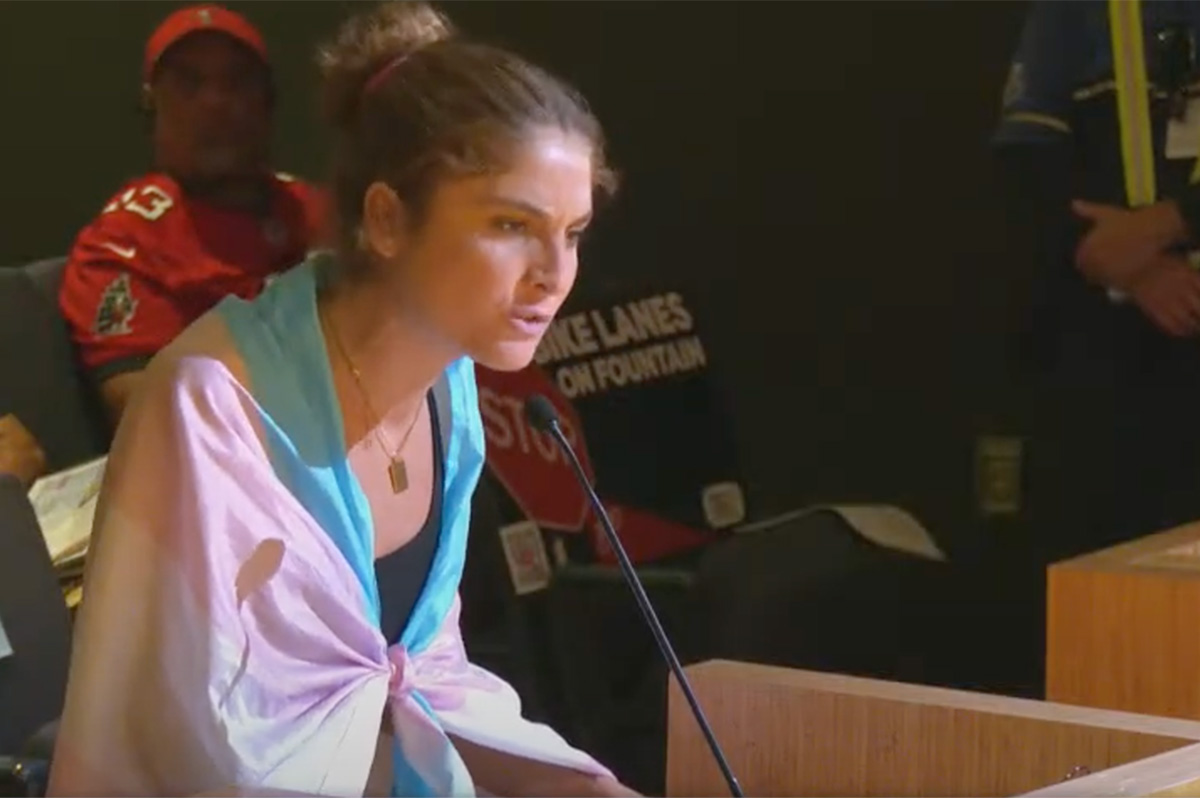
On Monday evening, West Hollywood residents packed the city’s council chambers ahead of the city council meeting. When the room opened up for public comment, several people loudly voiced their upset at the city’s decision to uphold President Trump’s recent proclamation, which ordered that U.S. flags at all public buildings and grounds be lowered to half-staff for four days following the death of Charlie Kirk.
Kirk was killed on Wednesday, September 10th, and was a prominent right-wing political activist, public speaker, and social media figure who gained popularity by participating in political debates with college students that were shared across YouTube, Instagram, and TikTok. He founded Turning Point USA in 2012, an organization dedicated to spreading conservative ideologies amongst young people. With over 18 million followers across Instagram and X, Kirk often took to the internet to share his anti-LBGTQ+ stances. He opposed same-sex marriage, called the need for gender affirming care a “mental disorder,” and supported the burning of Pride and Black Lives Matter flags.
When West Hollywood, a city that has long been home to much of the county’s LGBTQ+ communities, complied with the proclamation to honor Kirk’s death — community members were outraged.
Local resident Shannon Axe took the podium at last night’s meeting and called the decision “devastating.” She spoke of her own experience as a transgender woman, and how she is dedicated to supporting trans youth in an increasingly difficult social climate. “For me and for many others, these flags are not just fabric. They are a lifeline,” Axe continued, as applause reverberated around the room.
“They tell us ‘you are safe here. You are valued here. You belong here.’ To lower them in recognition of someone who has denied our humanity felt like erasing our dignity.”
Another community member, Nik Roybal, read from a poem they wrote in light of the city’s recent action. “Government, will you own your deceit? Government, will you witness our hurt, pain, anger, sadness? Why did you lower the flags for a terrorist, a white Christian nationalist?” Roybal recited. “This flag, this brown body, will not be lowered for a terrorist who wanted me and our siblings dead. Not in our name. To a city and a people that I love — not in our name.”
After public comment concluded, city manager David Wilson echoed a sentiment from the city’s official statement: that the City’s decision to comply with the presidential proclamation was not an endorsement of Kirk’s beliefs. Rather, it was following city protocol and United States Code.
But, Wilson clarified, that even traditional customs like this should be subject to more complex consideration if they present harm to local community members. “Thoughtful consideration should be taken to update this policy,” Wilson said. “I acknowledge that this decision has caused pain and frustration for many people in our community.”
Updates to the city’s flag policy will be discussed at the October 20 city council meeting.
Los Angeles
LGBTQ+ proponents respond to “devastating” Supreme Court ruling
Supreme Court allows “unlawful” immigration operations to continue

Since June, federal agencies began conducting mass immigration operations in Los Angeles and other major cities. For just as long, local residents, leaders, and advocacy groups have challenged their arrest and detainment practices, citing that their methods have violated constitutional rights.
In July, individual workers were joined by organizations like the Los Angeles Worker Center Network and the Coalition for Humane Immigrant Rights in filing a lawsuit against the Department of Homeland Security (DHS), arguing that federal agents had been illegally arresting people based on their perceived race, language and work — a violation of the Fourth Amendment.
As a result, two temporary restraining orders were issued, barring federal agents from stopping individuals without reasonable suspicion. DHS was also ordered to provide access to legal counsel for detainees.
On Monday, the Supreme Court voted to end this and granted the federal government’s application for a stay — or pause — of the temporary restraining orders. This will allow immigration operations to continue, and how they will proceed worries local leaders.
“This Supreme Court ruling strikes at the heart of who we are as a nation—allowing immigration agents to stop and detain people for little more than speaking Spanish or having brown skin,” wrote District 51 Assemblymember Rick Chavez Zbur, a longtime advocate for LGBTQ+ civil liberty. “This endangers our communities, undermines our democracy, and erodes constitutional rights.”
Some city officials hope to continue providing resources and support to affected community members. “As the raids were taking place across the region and in our own City, we took immediate action to ensure there are adequate resources to care for and support immigrants and their families,” wrote West Hollywood mayor Chelsea Byers. “This work will continue.”
West Hollywood was one of several Los Angeles county municipalities that filed a motion to intervene in the ongoing lawsuit, calling for the court to stop the federal government from conducting unlawful stops and searches that were based on assumed race and not on probable cause. It also activated its West Hollywood Responds program to raise awareness on available services like legal toolkits and training, consultations, access to free meals and more.
Local organizations are also extending their support. “The Supreme Court’s ruling is a devastating setback for Latine and immigrant communities, especially LGBTQ+ people who already face immense barriers to safety and belonging,” wrote Terra Russell-Slavin, the Los Angeles LGBT Center’s chief strategy officer. Russell-Slavin explained that the center has expanded free legal clinics both virtually and throughout the city to provide Know Your Rights workshops and other immigration and asylum support services.
“You are not alone,” Russell-Slavin continued. “And the Center will continue to stand with you.”
On September 24, the federal district court will hold a hearing to consider additional evidence and a possible preliminary injunction that will pause this most recent ruling.
Kristie Song reports for the Blade courtesy of the California Local News Fellowship
West Hollywood
Holloway Kitchen: Turning West Hollywood’s former IHOP into a hub for queer resilience and opportunity
Holloway Kitchen turns a vacant West Hollywood IHOP into a training hub for unhoused, queer, and immigrant residents, providing skills, jobs, housing support, and a voice in shaping systems that have long failed them.
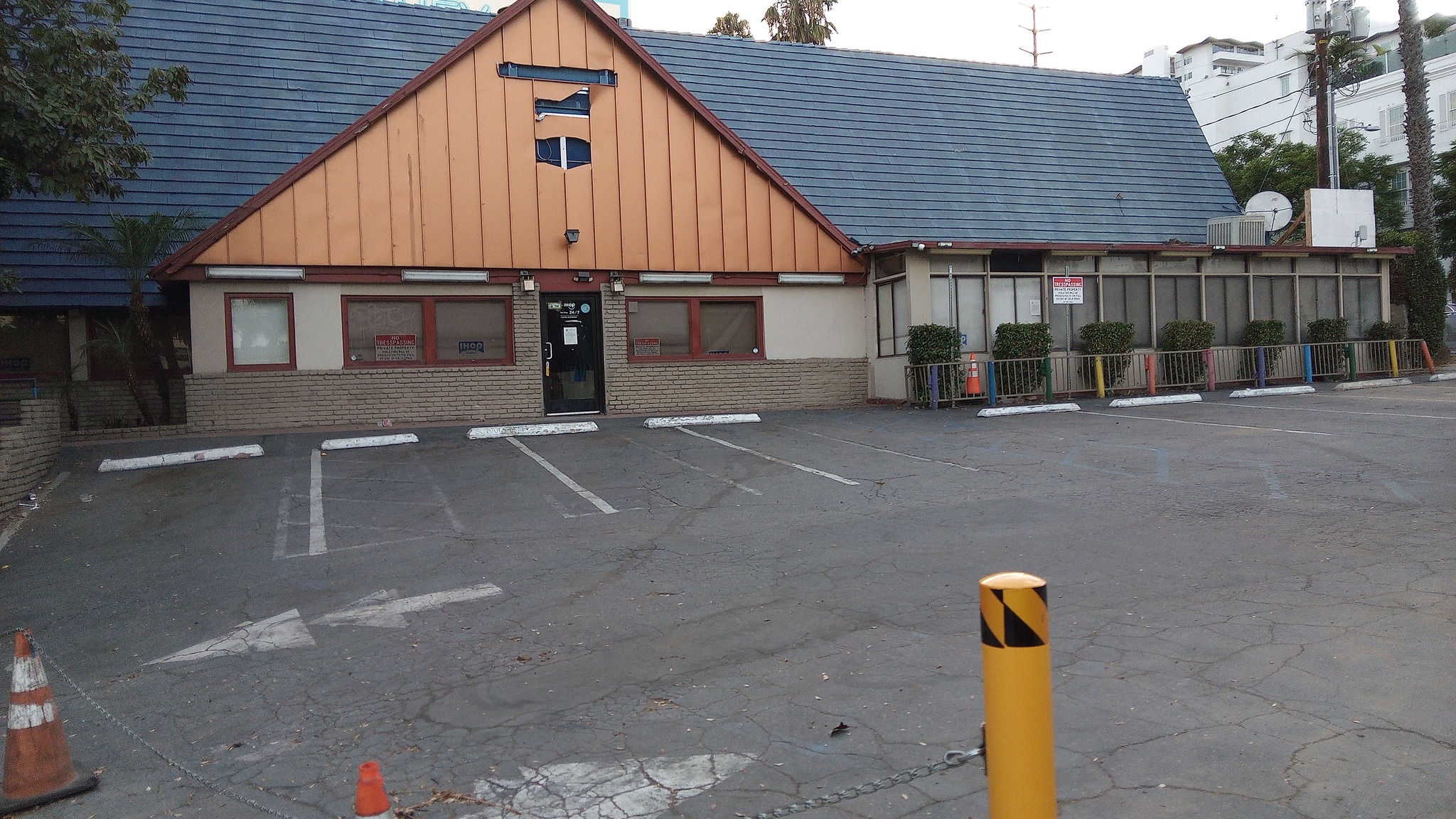
Homelessness in Los Angeles is not the result of personal failure. It is a predictable outcome of systemic inequities that push people to the margins while wealth and power concentrate elsewhere. Queer and immigrant communities often carry the heaviest burden. West Hollywood, long a site of queer resistance and organizing, now faces that crisis at its doorstep.
A new initiative, Holloway Kitchen, aims to respond. Proposed by Holloway Housing, the project would transform the long-vacant IHOP at 8461 Santa Monica Boulevard into more than a restaurant. It is designed as a community hub where food becomes a vehicle for structural change—offering training, jobs, and support to unhoused residents in West Hollywood.
“Holloway Kitchen is about dignity and empowerment,” said Jerry Soper III, founder of the project. “We are not just opening a restaurant; we’re creating pathways for people to build stability while being part of a community.”
The project is intended to work with residents of the nearby Holloway Interim Housing Program, managed by Ascencia, providing culinary and hospitality training through a proposed 12-week program. Graduates could secure jobs at Holloway Kitchen itself or with local partners such as SUR Restaurant, The Abbey Food & Bar, Mother Wolf, and the Hollywood Food Coalition.
Central to the vision is a commitment to those who face the steepest barriers. “LGBTQ+ youth face a 120% higher risk of homelessness,” Soper explained. “In Los Angeles, transgender individuals make up a significant portion of unsheltered populations. Holloway Kitchen aims to address these barriers with tailored support, flexible schedules for transition-related needs, and advocacy for queer youth facing housing discrimination.”
The restaurant itself would embody that same commitment to safety and affirmation. Plans include gender-neutral restrooms, a zero-tolerance harassment policy, and comprehensive LGBTQ+ sensitivity training for staff, in partnership with The Trevor Project and the Los Angeles LGBT Center. “We want every person who walks into Holloway Kitchen—whether as a trainee, employee, or customer—to feel affirmed and welcome,” Soper said.
Equally important, unhoused people will have a voice in shaping the project. Soper has convened an advisory board of Holloway House residents and alumni, including queer youth, immigrants, and trans women, to guide decisions on training, housing partnerships, and workplace culture.
Holloway Kitchen also seeks to honor West Hollywood’s legacy of queer organizing. “This project is inspired by the AIDS crisis response, when the community rallied to provide care, advocacy, and support,” Soper explained. Planned educational displays and events will highlight queer pioneers and the city’s history of resilience, blending historical reverence with forward-looking innovation.
The project is currently seeking $825,000–$1,075,000 in startup funding for renovations, staffing, and equipment, with a goal of opening in 2026. While the vision is ambitious, the City of West Hollywood underscored that it remains in the proposal stage. “The proposer has not, to date, been connected to the City, its service providers, or the property owner regarding this idea, and establishing these connections is a necessary prerequisite to consideration,” said Joshua Schare, City spokesperson. “We welcome the proposer to reach out to the City’s Human Services Division to discuss it further.”
Soper envisions the impact for participants: “In a year, a young queer person who comes to us with no job and no home could be thriving with stable employment, safe housing, and a support network. They would feel empowered to give back, becoming part of West Hollywood’s legacy of resilience.”
If successful, Holloway Kitchen could become a replicable model for addressing homelessness at the intersections of queerness, poverty, and immigration—providing a community-driven path toward opportunity where systems have historically failed. For now, it stands as a proposed initiative that seeks to reclaim power, restore dignity, and prove that survival is possible through solidarity and hope.
Palm Springs
Be Heard: Palm Springs Pride moves forward in 2025, celebrating resilience and resistance
Despite a $325K sponsorship shortfall, Palm Springs Pride presses on, celebrating LGBTQ+ resilience, community power, and the enduring spirit of resistance.
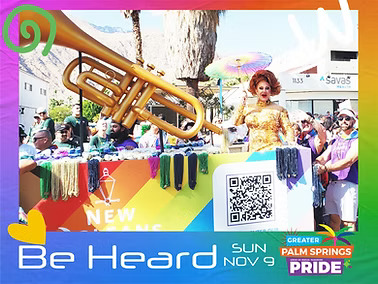
Despite facing a $325,000 shortfall in sponsorship funding, Greater Palm Springs Pride is pressing forward with its annual four-day celebration, which draws more than 200,000 attendees and generates millions in local economic impact.
“In our specific case, 60% of our shortfall is from one sponsor in Florida where the governor has directed a pullback from supporting DEI or related programs. The other 40% is a sign of economic times,” said Ron deHarte, President of Palm Springs Pride. “Partners who have and continue to support Palm Springs Pride are experiencing tighter budgets… we are confident good partners will continue their investment in our programming.”
The funding gap underscores how critical LGBTQ+ organizations are to their communities. DeHarte noted that these groups provide services ranging from crisis intervention for homeless youth to HIV/AIDS prevention, legal aid, and safe spaces. “When funding is cut or becomes unreliable, these vital services are put at risk. This not only undermines the organizations themselves but also directly impacts the well-being and safety of the individuals they serve. This financial pressure can be seen as a modern tactic of marginalization,” he said.
But this challenge is part of a much longer history of resilience for the LGBTQ+ community. “The history of Pride is fundamentally a story of resistance. From the Stonewall Uprising’s response to police harassment and brutality, the LGBTQ+ community has always had to fight for its right to exist openly and without fear… the collective pushback against legal, social, and political forces that have sought to push LGBTQ+ people to the margins defines what the LGBTQ+ movement has represented for the last 50 years,” deHarte said.
For deHarte, the shortfall is also a testament to the LGBTQ+ community’s ingenuity and self-reliance. “We are not victims. The LGBTQ+ community has a long history of fighting for its rights… The decision to proceed with Palm Springs Pride, even with fewer resources, is a testament to this spirit of self-reliance and strength. We have fought for everything we have. The rights and freedoms celebrated at Pride were not given freely; they were earned through decades of activism, advocacy, and sacrifice,” he explained.
“We do what needs to be done with the resources available. This year’s event will highlight the ingenuity and resourcefulness of the LGBTQ+ community. When faced with a lack of corporate sponsorships, grassroots support and community donations will fill the void. This underscores the idea that the community’s power comes from within, not from external validation or funding. We do more with less,” deHarte said.
Even with fewer resources, organizers say the festival will remain bold, inclusive, and unapologetically political. “It is vital that we stand together and show the world that our community is strong and our fight for equality continues. This year, more than ever, Palm Springs Pride will be a vibrant and political statement and a call to action that will not be quieted,” he added.
From its roots in grassroots protest to today’s massive celebration, Palm Springs Pride demonstrates the power of community, the resilience of a movement, and the enduring spirit of resistance — proving that Pride is not just a party, but a declaration: the fight for equality continues, and the LGBTQ+ community will not be silenced.
Those who want to support the festival can make a contribution online or participate in events like the Equality Walk, though attendance remains free to all.
You’ve linked the shortfall to the current political climate. When we look at the far-right media pipeline, it feels like they’re creating a lot of noise — but does that reflect reality on the ground?
In our specific case, and we point out every Pride organization is unique, 60% of our shortfall is from one sponsor in Florida where the governor has directed a pullback from supporting DEI or related programs. The other 40% is a sign of economic times. Partners who have and continue to support Palm Springs Pride are experiencing tighter budgets. They have been supportive in the past, are continuing to be supportive today. We are confident good partners will continue their investment in our programming.
Corporations seem to react quickly to that noise, often pulling back support out of fear. Do you see that as a reflection of real public opinion, or more about how power operates in boardrooms and newsrooms?
We have heard of this happening with some very large Pride organizations across the country. But when you step back and look at the 450-500 Pride events in the United States, a very small percentage of those events have experienced the corporate retreat you mention.
Pride was born as resistance to systems of power that wanted us silent. How do you see this year’s funding shortfall fitting into that longer history of LGBTQ+ people being pushed to the margins? Has the resistance ever changed?
The history of Pride is fundamentally a story of resistance. From the Stonewall Uprising’s response to police harassment and brutality, the LGBTQ+ community has always had to fight for its right to exist openly and without fear. The root of the struggle has been about individual rights; however, the collective pushback against legal, social, and political forces that have sought to push LGBTQ+ people to the margins defines what the LGBTQ+ movement has represented for the last 50 years.
In this context, the recent funding shortfall for LGBTQ+ organizations is a deeply concerning development that fits into this long history of marginalization. It is a modern form of the same pressure that has historically been used to silence and undermine the community.
The struggle for equality continues. Funding shortfalls for LGBTQ+ organizations represents a new front in this ongoing battle. These organizations are critical, providing a range of essential services for crisis intervention for homeless youth, healthcare access and HIV/AIDS prevention, legal aid for discrimination cases and community centers that provide safe spaces. When funding is cut or becomes unreliable, these vital services are put at risk. This not only undermines the organizations themselves but also directly impacts the well-being and safety of the individuals they serve. This financial pressure can be seen as a modern tactic of marginalization, as it seeks to weaken the infrastructure that the LGBTQ+ community relies on to advocate for its rights and support its members.
The funding shortfall is not just a financial issue; it’s an issue of social justice. It highlights the continued need for vigilance and support to ensure that the progress made by the LGBTQ+ community is not rolled back.
Corporate sponsorship often comes with strings attached and can vanish in the face of political pressure. What does it take to build support that is unshakeable, rooted in actual community power rather than optics?
What sponsorship support comes with no strings attached or no risk of future investment? Grants have deliverables and restrictions, city government funding is dependent on political support, businesses want logo exposure / tickets/ recognition, and now federal grants require removal of any transgender language. One would think individuals would freely donate to their local Pride but many view Pride as a party. It would be great for individual donors to replace the funds currently provided by large money sponsors. While many Pride events are free to attend, implementing small fees for certain aspects can generate significant revenue. Tickets for specific concerts, reserved seating for the parade, or fundraisers throughout the year are also ways to shift the funding model. These are all opportunities. We need to do a better job letting the community know how they can support.
Is it fair to say that relying on corporations has sometimes weakened Pride’s political edge? How do you balance funding needs with staying true to a movement built on resistance?
In our case we have never tempered the political nature of Pride in Palm Springs. However, we have experienced parade participants pulling out because they feel the parade is too political.
What role do you see for small businesses, local organizers, and everyday community members in sustaining Pride, especially when big sponsors pull out?
For free Pride events like Palm Springs Pride, attendees can help by donating $10 bucks (or more) online in place of buying a ticket. Many small businesses who are able already support Pride. However, there are many others who benefit from the economic impact a Pride event has in the community who choose not to provide support. Our message is that we welcome everyone, we are a free event and donations are appreciated to cover expenses.
Systems of power that target queer people are also targeting immigrants, BIPOC communities, and other marginalized groups. How do you see Pride standing in solidarity across those struggles?
We are immigrants. We are the BIPOC community. While Palm Springs is widely known as a welcoming and inclusive city for the LGBTQ+ community, groups within the community face additional layers of marginalization. These groups often experience unique challenges due to the intersection of their LGBTQ+ identity with other identities, such as race, age, and disability. We are one and must ensure TGI individuals, LGBTQ+ people of color, youth, older adults and individuals with disabilities are at the table.
Are there lessons from mutual aid and grassroots organizing that could reshape how Pride operates — making it more of a real support network, not just a festival?
Yes, the origin of Pride is in grassroots organizing and protest. While the modern landscape includes celebratory elements and corporate involvement, look behind the curtain, and one will see its core purpose remains a powerful blend of community building, activism, and providing a crucial support network for LGBTQ+ people. That’s grassroots in 2025. In Palm Springs, it is, and always has been, more than just a party. Pride is fundamentally a real and vital support network for the LGBTQ+ community.
At a grassroots level, Pride provides a space for LGBTQ+ individuals to be their authentic selves without fear of shame or stigma. This visibility is powerful, especially for those who may feel isolated in their daily lives. Pride events, and the organizations behind them, connect people with a “chosen family” and a sense of belonging. Pride continues to be a call to action. It raises awareness about ongoing struggles for equality and rights, and it is a powerful opportunity for protest and political mobilization.
Looking back at the history of Pride as a movement born from resistance, does this funding crisis feel like an opportunity to recenter the movement on community accountability, activism, and care networks rather than corporate sponsorship?
This is certainly a time to ensure our platform reignites the Pride experience to demand rights, protest injustice, and raise awareness about ongoing struggles of the community. The current funding crisis, while difficult, presents a chance to fortify the movement from the ground up, ensuring it remains a powerful force for advocacy and community care, rather than a perceived corporate-sponsored spectacle. It is vital that we stand together and show the world that our community is strong and our fight for equality continues. This year, more than ever, Palm Springs Pride will be a vibrant and political statement and a call to action that will not be quieted.
What would you say to those watching from outside the LGBTQ+ community? What message does Palm Springs Pride send by moving forward this year despite these setbacks?
To those watching from outside the LGBTQ+ community, Palm Springs Pride sends a powerful and unwavering message. It is a message of resilience, determination, and a refusal to be silenced. By moving forward this year despite recent funding shortfall due to a challenging political climate, Palm Springs Pride is showing our commitment is not conditional on easy circumstances. We are demonstrating that Pride is more than a party; it is a fundamental act of visible existence, a celebration of hard-won rights, and a continued protest against injustice.
We are not victims. The LGBTQ+ community has a long history of fighting for its rights. From daily struggles for equality, the community has always had to create our own path forward. The decision to proceed with Palm Springs Pride, even with fewer resources, is a testament to this spirit of self-reliance and strength. We have fought for everything we have. The rights and freedoms celebrated at Pride were not given freely; they were earned through decades of activism, advocacy, and sacrifice. This year’s events serve as a reminder of this ongoing struggle and honors the pioneers who paved the way.
We do what needs to be done with the resources available. This year’s event will highlight the ingenuity and resourcefulness of the LGBTQ+ community. When faced with a lack of corporate sponsorships, grassroots support and community donations will fill the void. This underscores the idea that the community’s power comes from within, not from external validation or funding. We do more with less. The ability to adapt and thrive in the face of adversity is a defining characteristic of the LGBTQ+ community. Palm Springs Pride’s continued existence despite a budget reduction shows that the core message and purpose of the event are not dependent on a lavish production. The focus remains on community, activism, and a powerful, visible presence.
Palm Springs Pride Celebration 2025 / Thur Nov 6 through Sun Nov 9 FREE ADMISSION
California
Kamala Harris opts out of Governor’s race: What does that mean for 2028 and trans rights?
From her time in the courtroom to the Senate floor and the White House, Harris has built a career within the political system. But her latest message hints at a shift in strategy.

Vice President Kamala Harris announced today that she will not run for Governor of California in 2026, putting to rest long-standing speculation about her political future. In a public statement, Harris said she spent the past six months reflecting on “the best way for [her] to continue fighting for the American people and advancing the values and ideals [she holds] dear.”
From her time in the courtroom to the Senate floor and the White House, Harris has built a career within the political system. But her latest message hints at a shift in strategy.
“We must be willing to pursue change through new methods and fresh thinking,” she wrote, “committed to our same values and principles, but not bound by the same playbook.”
While stepping back from the governor’s race, Harris made it clear she’s not stepping away from politics. She plans to campaign for Democrats nationwide and suggested more details about her next chapter are on the horizon.
Her announcement comes at a time when the Democratic Party is facing urgent questions about whether it will fully defend trans lives amid rising attacks. California Governor Gavin Newsom recently called it “deeply unfair” for transgender athletes to participate in girls’ sports. Former Transportation Secretary Pete Buttigieg echoed the same framing, saying, “most reasonable people agree that it’s a serious fairness issue.” These are not harmless statements; they are capitulations to anti-trans narratives that frame our right to exist and participate as something debatable.
These statements from two of the party’s most visible figures aren’t outliers either; they reflect a broader trend of Democratic leaders hedging their language or pandering to the center instead of standing firmly for trans people’s dignity and rights. While Harris didn’t mention trans issues in her statement, her record is also mixed. She has caused harm in the past but has shown signs of growth, becoming more publicly supportive of trans rights in recent years. Still, symbolic gestures are no longer enough. The real question now is: what comes next?
As Harris, Newsom, and Buttigieg emerge as likely contenders for the 2028 Democratic presidential nomination, transgender Americans and our allies are paying close attention. We are tired of being treated as a liability, a distraction, or a political bargaining chip. We are not a wedge issue.
We are voters. We are organizers. We are human beings. And we deserve to know which of these potential leaders will truly fight for us, not just when it’s politically safe, but when it matters most.
-
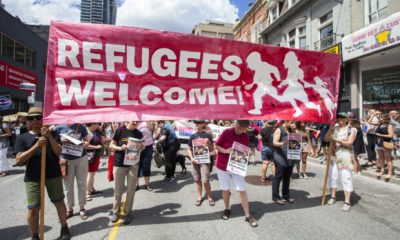
 LGBTQ+ RESOURCES4 days ago
LGBTQ+ RESOURCES4 days agoHope on the other side: How Rainbow Railroad rescues LGBTQI+ people at risk around the world
-

 Movies3 days ago
Movies3 days agoIntensive ‘Riefenstahl’ doc dives deep into a life of denial
-
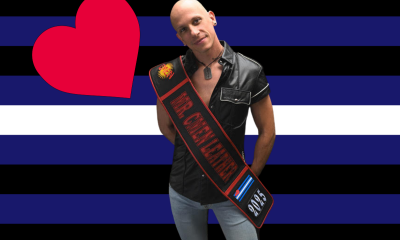
 Features1 day ago
Features1 day agoHarnessing identity: Mr. CMEN Leather 2025 bares his heart and soul
-

 Books3 days ago
Books3 days agoThese four intertwined stories will leave you flabbergasted
-
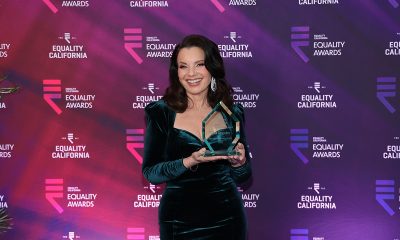
 Events22 hours ago
Events22 hours ago“We are glimmers of hope”: LGBTQ+ advocates deliver powerful speeches defending queer rights at Equality Awards
-

 Miscellaneous1 day ago
Miscellaneous1 day agoTiffany ‘New York’ Pollard Dishes on queer storytelling in her new show ‘Slayers: Wheel of Fate’
-

 National3 hours ago
National3 hours agoLGBTQ rights on the line: What to watch as Supreme Court’s new term begins
-
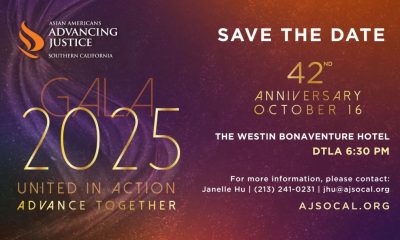
 Events2 hours ago
Events2 hours agoThe Los Angeles Blade Partners with AJSOCAL to host gala uplifting AAPI joy and resistance






